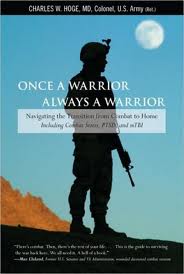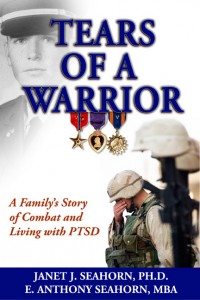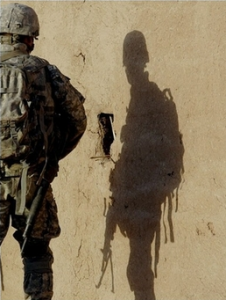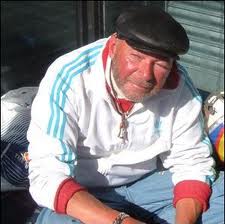Mar
17
AGING WITH TRAUMA
Filed Under Aging, Healing Waters, Life, PTSD, Tears of a Warrior, Trauma | Comments Off on AGING WITH TRAUMA
by Janet J. Seahorn, Ph.D

Yikes! When we read about the Golden Years they don’t always seem so wonderful. Most of you have read that old saying, “aging is not for sissies”, and that cliché was written for the average person who has a lighter set of luggage to carry. For veterans and their families, many don’t carry bags of crap; they have a huge trunk of it, and it doesn’t seem to get lighter with time.
For almost two years I have resisted writing this particular blog. Why? Because it scares the #### out of me. I admit it; I am a sissy for growing old. Not because I am afraid of needing an expensive face lift, or having to wear fancy old people diapers. OK, those things do concern me, but they aren’t nearly as distressing as the more intrusive symptoms of age. Now, add the effects of living a lifetime suffering with PTSD or living with someone with PTSD and the image gets uglier. Even strong, rose colored glasses haven’t been able to calm my apprehension. Therefore, it is time I write what I know, and have known for a very long time. Aging with trauma is not for fragile minds or bodies.
Here are some facts that have been around for a long time regarding aging and PTSD.
- People with type 2 diabetes who also suffer with PTSD face a 36% higher risk of going blind or developing kidney disease (American Diabetes Association).
- Heart problems and high blood pressure are more common — DUH!
- Mood disorders such as depression are more prevalent if one has not sought help. Double Duh!
- Depression increases the risk of heart attack by 25% (VFW, March 2011)
- Alzheimer and/or dementia increases.
We have long known that PTSD affects the body and the brain, so it is not a big aha that any of these conditions gets worse with age since the body’s immune system is weakened and not as robust as when we are young. In giving all of these amusing statistics, I can’t stop without putting in some actions that will prolong the drought of age. Again, we all know these but sometimes do little to practice what know. Call it lack of well-power or procrastination, the two twins of sin.
- 1. Exercise everyday. This promotes blood flow to the brain which is pretty darn important for keeping the feeble thinking and crippled rascals at bay. It also increases muscle mass and strengthens bones keeping us from being in a wheel-chair instead of on a ski lift.
- 2. Watch what you eat… “What’s on your plate determines your fate.” Damn, I love a warm, gooey chocolate donut, a double scoop of ice cream, or a basket of salty French fires, and they seem to love me, my thighs and clotted arteries just as much.
- 3. Drink lots of water. It is the best purifier of the body and removes all that excess material, especially sodium that helps lower heart pressure.
- 4. Practice deep breathing and meditation. Lots of research shows how these actions promote a sense of well-being… only problem is my lack of concentration. Practice makes this better and really does improve the entire mind/body.
- 5. Add more fiber to your diet. J I don’t think I need to go into detail with this one, but fiber literally will help lighten our trunks of crap.
- 6. Get plenty of sleep. Nothing can take the place of rest for promoting good health.
- 7. At least I can still have my lattes and tea… at least four hours before bedtime.
- 8. Oh, and don’t forget laughter, it is the best of all exercises for our mind, our bodies, and our hearts.
Aging is inevitable, but aging with grace and good health will take courage, will-power, and making good personal choices.
Feb
15
WICKED PROBLEMS
Filed Under Combat PTSD, PTSD, PTSD treatment, Tears of a Warrior, Trauma, Treating PTSD, War | Comments Off on WICKED PROBLEMS
by Janet J. Seahorn, Ph.D

No doubt about it, PTSD is a very Wicked Problem. Wicked Problems, by definition, are those dilemmas that cannot be solved easily by using a typical approach. Anyone living with traumatic stress, especially those pressures caused by combat, will attest to the challenges of trying to solve the predicament of moving through his/her life carrying the memories and phantoms of war. If the solution was easy, it would have been found centuries ago. Yet, here we are today, in 2011, and the Wicked Problem still exists.
One of the Wicked Problems of trauma is surviving the depression that can be a part of the conflict. How does a person live with long-term depression that often becomes the new normal after battle? Constance Gibbons, one of our readers, wrote last week and shared how depression has been the new normal for many vets including her husband. After years of having it a part of their daily being, it becomes their after war identity. She stated: Another interesting aspect from those of us observers – spouses, et al – was that universally we noted the levels of sort of a baseline enthusiasm, whereas, the vet thought they were quite fine.
She explained further: As you continue to think of ‘depression’ as it may be portrayed by the vet, maybe think of a sense of resolution, unknowing acceptance, somewhere in a lower zonal level (between overconfidence and fear) from the years of living on the cusp of life and death, at a level of continuing risk so great that without the impact of the continuing penetration, after, into youthful vulnerability, it appears to those of us in observation to be baseline depression…where it is not to the vet; just an absence of heightened stimulation. Wow, now how would anyone solve such a Problem?
Veterans carry many Wicked Problems – ghosts of death and shocks of battle, memories that make if difficult to stay grounded in every day activities, and struggles to avoid the sleepless nights where staying awake is one way to keep the dreams of foreign battles from returning. New therapies and medications have helped lower the impact of PTSD but it has not solved the Problem. I read many blogs and articles relating combat PTSD to the trauma that the average person might experience. Things such as car accidents, rape, assault… all which are terrible and difficult to cope. Yet, these are hard to compare to combat where trauma occurs every day, often numerous times in a day. One of the biggest differences is besides being the prey, in combat you must also become the predator. Instead of being involved in one brutal injury or death, you may experience many.
Fighting the Wicked Problems of war takes work. It requires listening to your gut feelings as well as how others around you perceive your behaviors. The good fight involves muffling the loud voices in the head long enough to examine realistic solutions. Perhaps there will be no absolute solution to PTSD, but every day there are warriors who conquer their demons and live full and meaningful lives. Wicked Problem you may remain, but you will not take more of a warrior’s life than you already stole. You will not win this internal war, even if you succeed in taking an emotional battle now and then. You see, Wicked PTSD Problem, in spite of your persistent, you are no match for the courage and willpower of a WARRIOR.

Jan
26
HIDDEN IN PLAIN SIGHT
Filed Under Combat PTSD, Life, Peace, PTSD, TBI & PTSD, Tears of a Warrior, Trauma, War, Wisdom | Comments Off on HIDDEN IN PLAIN SIGHT
by Janet J. Seahorn, Ph.D

There is a phrase that one hears every now and then, Hidden in Plain Sight. Four simple words that eloquently reveal the complexity of the impact of trauma on one’s mind, heart, and soul. We see the person; we look at the eyes, the body language, the being’s form. The suffering is present in plain sight for all to witness. Yet, few do, lacking the keen observational heart skills required to notice anguish.
There are days I wish I didn’t see it – the faces of children battered by abuse and neglect; the adolescent’s depressive absorption into the ugly world of alcohol and drugs, and the veiled, but ever present ghosts of veterans, young and old carrying their memories of war. They haunt me as the world moves around their pain because it is hidden in plain sight.
Much like ‘Don’t Ask, Don’t Tell’, we are a nation that prefers to maintain our equilibrium at all cost. We tend to be uncomfortable with sorrow even when it stands knocking at our front door asking only for recognition and a bit of compassion.
We say we are a nation of empathy, yet often dismiss the humanity that exists in every person, especially those with whom we don’t agree. We argue we are intelligent, proficient thinkers, yet fight rigorously to disqualify any information that does not align with our personal paradigms/beliefs, whether true or misleading, without accurate evidence or data.
The answers to our current and future problems are available, but for too many they are hidden in plain sight. It will take incredible courage to look into our own minds and hearts searching for what is right and true. It will take courage and honest self-reflection to heal the hidden wounds of the wounded, but it can be done. What lies before us does not need to consume us with fear or apprehension. When confronted, trauma and pain can be overcome and no longer hidden or carried alone.
Light and sunshine are incredible healers.
Nov
9
THERE WILL ALWAYS BE
Filed Under Family, Peace, Tears of a Warrior, Trauma, Wisdom | Comments Off on THERE WILL ALWAYS BE
by Janet J. Seahorn, Ph.D

It is hard to believe that another holiday season is upon us, beginning with Thanksgiving and ending with the celebration of a New Year. With this period comes the challenge of facing the days with too much to do or too much idle time, too many people to be around or too much loneliness, and the memories of past holidays spent in combat or loss. For some, these are anniversaries of death and destruction. They may not bring joy and goodwill, but sadness and loss.
So, I write today’s blog to remind myself and perhaps others confronted by the days ahead to not be afraid of the darkness. It is not about getting rid of the shadows but getting beyond them. Stepping into sunlight, even a small glint is enough to dispel some of our gloom. As human beings we were not meant to stay in sadness but to shine, in spite of our troubles and hurts. Hard to believe, but nonetheless true.
The only way I can ever get beyond the shadows is to look up; to search for the pure, the just, and the beautiful. To focus on what can be if I keep moving forward. I do not have to center my thoughts only on what has been lost, but what is waiting to be gained if only I believe. Believe in the goodness of others; they abundantly surround us waiting to enter our life. Believe in a more loving world even when the media fill the airways with ugliness. Believe that as we search for the decent we find it in the softness of a breeze, the melody of a song, or the laughter of a child.
A few months ago my sister gave me a CD by the Canadian Tenors. On the album is a lovely song with a chorus all of us can use at sometime in our lives:
There will always be a shining star;
There will always be the rising of the sea;
There will always be an angel watching over me…
And angels voices say to us, these things will never die.
Choose to believe the skies are filled with shining stars even if clouds conceal them. The seas and oceans rise and fall with the changing tides. Most comforting of all is choosing to believe that there will always be angels watching over us… and these things will never die. So if you wander into that dark place, remind yourself of those angels, the thousands of shining stars, and perhaps you will be the tender hand reaching out to hold another being in need of your light.
Nov
2
THE EYES OF TRAUMA
Filed Under Civilian life, Combat PTSD, Life, Tears of a Warrior, Trauma, War, Wisdom | Comments Off on THE EYES OF TRAUMA

A face conceals many things through silent smiles and quiet words. Yet eyes speak silence louder, clearer than any verbal language. The mouth can easily fake joy, and talk can be nothing more than convincing noise. But the eyes, the eyes can’t fake unfelt laughter or peace. The eyes tell their own story. A story that sometimes screams of sadness; a story that carries the pain of guilt and desperation; a story burdened by trauma inflicted by war, abuse, or neglect.
Perhaps this is why few people are strong enough to stare into another’s eyes without looking away. When doing so we are really checking for evidence that what is said matches what is unsaid. Only eyes can confirm such a truth. We listen more fully, not just with our ears, but with our eyes. Deep listening is what many psychologists such as Daniel Siegel refer to as “feeling felt”. Feeling Felt tells the story teller that he/she matters. That his/her experiences are valued and honored.
Why would I write a blog about eyes? Simple, many, many beings are walking through our world with silent screams. No one seems to notice or take time to pay attention. Few things in life are harder for a human being to sustain than being invisible to others. Homeless people understand, abused children understand, and traumatized vets understand.
Next time you see someone whom you suspect may need to be seen, be brave enough and care enough to listen to what the eyes are saying. It is a humbling tribute that a person has placed his/her trust in your willingness to be with them, even for only a small amount of time.
Oct
27
NOT YET, NOT YET
Filed Under Black Lions, Combat PTSD, Family, PTSD, Trauma, Vietnam Reunion, War | Comments Off on NOT YET, NOT YET

“Not yet, not yet.” These were the words a mother of a soldier who returned from war with severe, incapacitating PTSD composed to her son’s commanding officer almost forty years later. The mother wrote from a voice in heaven, as if her son had died, because in many ways he had – died emotionally; died cognitively; and died in spirit. Years had passed and she wanted his leader to know how much her son admired the man. How much he believed the officer had done everything possible to prevent the ambush that cost the lives of sixty-four troops. A dispensation of grace, for through her son’s stories, the mother realized how much trauma and burden the officer must be carrying from such a massive loss of life.
Even after four decades the pain and memories still persist as if the battle had just occurred. I am left to wonder how long a human being must or can endure such heartache. Being in charge of the lives of others is an incredible responsibility. A responsibility that makes losing those he led more devastating. One death would have been terrible, but sixty-four is beyond measure.
We heard the story while attending a reunion of the Black Lions who served in Vietnam. The get-together was a relatively small gathering compared to many war reunions. Small because the Black Lions were an elite unit of soldiers who traveled light both in men and equipment. And smaller still because so many had died during the many jungle encounters with the enemy.
Almost every survivor had a story and every attendee had an inner strength that somehow allowed him to live forward each day until now. I only hope that at this point, the time that remains in these old warrior lives can be lived with great joy, peace and personal forgiveness if needed. Our veterans deserve a bit of these gifts and so do their families. So when the mother wrote, “Not yet, not yet,” meaning… do not leave this earth too soon, the same words persist, “not yet, not yet”, the time for personal healing is now!
Blessings and God Bless our vets young and old.
Sep
28
SUICIDE: DID YOU KNOW?
Filed Under Combat PTSD, Life, PTSD treatment, Tears of a Warrior, Trauma, Treating PTSD, War | 1 Comment
by Janet J. Seahorn, Ph.D
Did you Know:
·
Suicide is one of the leading causes of death in America. Every year it takes more lives than auto accidents.
· Suicide impacts kids as young as five and as old as ninety-five.
· The rate of suicide in the armed forces continues to grow with each deployment.
· Current statistics show an active-duty suicide every 36 hours – 18 veterans a day dies by their own hand (Lily Casura, Napa Valley Register, 9/19/2010).
· Women vets are two – three times more likely to commit suicide than non-veteran women (American Psychiatric Association)
· Suicide is more than an emotional state; it is a physical condition as well.
· Depression is treatable… suicide is not —– the final step has already been taken.
Combat is an unhealthy enough challenge. Yet, when a veteran returns home, the struggle may be even worse. Worse because there are fewer people to talk to who understand what he/she has gone through. Worse because during combat one didn’t always have time to think about the horrors of war; now at home, there is often too much time to think. And worse, because depression of any kind is a hidden desperado that becomes a very real physical condition, few understand and address the issue.
In so many cultures, including American, we have been led to believe that depression is something that is strictly emotional. Something that we can easily get over if we just put our “minds” to it. It invades every cell of the body. It steals the good hormones such as serotonin, endorphins, dopamine… and replaces them with a whopping dose of cortisol – one of the stress hormones that cause fight, flight, or freeze. Unfortunately for many, the way one may must fight or fight depression is suicide.
One reason this issue is so important to me is it hits close to home. In the city of Fort Collins, Colorado, suicide has already been the cause of over 39 deaths this year – far more than those who die in traffic accidents. One of those statistics was a close friend of a student in my university class. Imagine sitting in class and getting a text message stating your close friend has taken her life. When I was teaching middle school many years ago, a wonderful young man decided to end his life before he ever had a chance to begin his life. His parents were certain their child’s death was an accident, even though evidence indicate the young man made three different attempts at ending his life before one finally worked.
It is important we all know more about this topic, Suicide. Like any enemy, the more we know about our opponent, the better we can fight the battle and win. So I’ll end with one of my favorite quotes by Emily Dickinson, “Not knowing when the dawn will come, I open every door.” Try to keep opening new doors; sunshine is waiting behind one of them. 
Jun
24
Healing Waters & Wounded Warriors
Filed Under Healing Waters, Tears of a Warrior, Trauma, Treating PTSD, War | 1 Comment
 by Janet J. Seahorn
by Janet J. Seahorn
How do we mend a wounded body or soul? How do we take a step forward in healing a spirit that has been battered by the trauma of battle? One possibility is to introduce the wounded warrior to a place of cooling waters, a place where fish are abundant and one can float through the waters which hum a soothing lullaby of serenity. Project Healing Waters is a volunteer organization that is dedicated to supporting the mending process of military personnel and veterans who have been impacted by the effects of combat. And it uses waters and fly fishing to achieve its mission.
The idea originated when its founder, Ed Nicholson, a veteran of previous war, was himself being treated at Walter Reed Medical Center in Washington D.C. when he noticed a number of young warriors sitting idly in the waiting room. Ed decided to invite several to go fishing with him. On that first excursion, he discovered how this simple fishing experience made a huge difference both physically and emotionally with the young vets. Where eyes were once vacant, there was now a light of excitement; where physical energy was almost stagnate, a resurgence of vigor returned; and where a life seemed consumed by pain and hopelessness, Mother Nature breathed her message of rebirth and Trust into the mind, heart, body, and soul of the wounded warrior.
Ironically, the Healing Waters Foundation has found that the greatest challenge is getting Wounded Warriors to the program. Recruitment is a huge obstacle, partly because of the physical and emotional needs of the individuals, and partly because of the legal ramifications of the vet centers/hospital treating the individuals. Gosh, I never imagined the number of logistical barriers faced by organizations wanting to help make a difference.
Project Healing Waters tries to work through a VA therapist to identify prospective participants. By having a solid system in place, both the support organization and the VA centers can offer a clearer, more holistic approach to healing. The intervention received by the vet can then be measured and assessed as to what works best and why. This knowledge can then be shared with other VA centers and hospitals across the United States.
Ancient cultures have long understood that wounds of the body and soul need a holistic approach for healing to occur. Medications, cognitive therapies, surgeries simply aren’t enough. Where medications have some difficult side effects, nature offers only blessings. Where daily life often brings disorder, there is an order in nature – a way in which all things seem divinely connected from a single rain drop to a flowering mountain meadow. Where days feel misaligned, nature realigns the soul and spirit, letting us knows that all is as it should be. And where our day- by-day activities may seem bounded by the constraints of “to do lists”, nature chants a song of freedom, encouraging us to spread our wings and soar – even if these wings feel shattered.
So, if you are a disabled vet, knock down the door of your local VA center or hospital and request that your medical personnel get you aligned with a volunteer from Healing Waters. This can also be a breathtaking opportunity for you and your family.
Healing Waters volunteers serve as mentors and companions to our country’s wounded warriors. Their mission is uncomplicated – it is merely about healing and mending minds, bodies, and spirits – one unhurried cast at a time – one soothing river somewhere in America. Casting, Healing. Casting, Healing. Casting, Healing, and the wounds begin to slowly mend.
HEALING WATERS
My soul was battered by combat’s horrors,
So I went to the water to heal.
Wounds covered by flesh with war torn scars,
I went to the water to heal.
My heart was broken unable to feel,
I went to the water to heal.
And the water murmured softly–
Be at peace my precious son
Your soul is safe,
Your battles are done.
My waters shall cool and soothe your weary heart,
You came to me
Your healing can now start.
Not knowing where to turn for comfort or for calm,
I went to the water to heal.
The deafening clatter of ghosts from the past,
I went to the water to heal.
The strain of the city made my sanity reel,
I went to the water to heal.
And the water murmured softly
Sit beside me and be still,
Listen to my tranquil song
Let your soul be filled.
My waters shall comfort your torn and tattered soul.
You came to me
I will purge you of your foes.
For sacred, healing waters
are not new to any man,
They’ve been around a long time
Lapping shores of golden sand.
Silently restoring with their tender, gentle hands
A Life to kinder being
Healing water shall command.
by Janet J. Seahorn
Mar
24
SNOTTY FISH AND PTSD
Filed Under Life, Love, PTSD, Trauma, War | Comments Off on SNOTTY FISH AND PTSD
by Janet J. Seahorn
 This weekend I heard an experienced angler talk about the joys of being in a stream or lake fishing for Snotty Fish. Snotty Fish, he thoughtfully explained, were those fish that were not easy to catch. They were fish that could not be tricked by some ordinary fly or enticing lure. More than likely, such fish had, in some earlier time, been caught before and managed to escape through sheer luck, tenacity, or down right determination. After going through such a traumatic encounter, they were more cautious than most of their finned friends. They understood the consequences of impulsively taking the enticing lure. Therefore, the fisherman who caught (and released) such a Snotty Fish had to be incredibly patient, knowledgeable, and persistent. This particular angler made it clear that catching Snotty Fish was the best and most rewarding way to angle.
This weekend I heard an experienced angler talk about the joys of being in a stream or lake fishing for Snotty Fish. Snotty Fish, he thoughtfully explained, were those fish that were not easy to catch. They were fish that could not be tricked by some ordinary fly or enticing lure. More than likely, such fish had, in some earlier time, been caught before and managed to escape through sheer luck, tenacity, or down right determination. After going through such a traumatic encounter, they were more cautious than most of their finned friends. They understood the consequences of impulsively taking the enticing lure. Therefore, the fisherman who caught (and released) such a Snotty Fish had to be incredibly patient, knowledgeable, and persistent. This particular angler made it clear that catching Snotty Fish was the best and most rewarding way to angle.
Listening to this person talk, I began to comparing how similar Snotty Fish were to veterans who are living with Post-Traumatic Stress. Many of our troops have experienced the traumas of combat. Men and women who have seen and participated in some of humanities worst deeds; deeds that stay etched on the mind and heart. Vets, who when they return to the mainstreams of society, may be unable to trust others, their governments, and even themselves. Yep, Snotty Vets!
Snotty Vets, like Snotty Fish, are often hard to play out. They have experienced lessons in life that few of their fellow countrymen have ever imagined. Such knowledge often makes them wary of their surroundings, including trusting in their own abilities and worthiness. For family and friends, this knowledge can make these Snotty Vets difficult to live with and understand.
Yet, here is the beauty of being in streams with Snotty Vets—they are worth the time and effort to catch and reel back to wellbeing. Health care professionals recognize this fact. Families, friends and communities who walk the path through appropriate support, timely information and love come to empathize with the journey and value the internal strength, courage, and effort that each of them must live out in order to heal.
So you see, Snotty Vets like Snotty Fish are well worth such effort. Simply swimming in their waters help us have greater gratitude for their sacrifice.
Here’s a toast to all of you Snotty Vets, and to all the spouses, children, and siblings of Snotty Vets: “May your new streams be filled with an abundance of peace, joy, and good vigor. May your days bring you fulfillment, and your nights quiet rest. And may you continue to embrace your Snotty strength and leave behind the sorrows of the battlefield. For you are our precious Snotty Vets. We love you. We honor you. And, most of all, we need you to become whole again.”
Mar
9
 by Janet J. Seahorn
by Janet J. Seahorn
Some days life is a real challenge. It tests us in many ways. Ways to be smarter. Ways to be braver. Ways to be more thoughtful. Ways to be kinder and more compassionate. And some days, ways to just keep getting up every morning, breathing through each minute and making it through some dark and lonely nights. Living with Post-Traumatic Stress compounds all of these “tests”. At times it may even seem that the journey is too long or too brutal; that the suffering is unending and the battle unachievable. It is during such times that we must remember we are not alone in our ordeals. Reminding that someone, something (for me it is my faith) is walking beside us telling us quietly that we will be OK. Urging us, “Don’t Quit”. We do not know what tomorrow may bring. But if we Don’t Quit, I do believe in the appearance of a brighter, happier day. Believe you have what it takes to pass any test. And whatever comes your way —Don’t Quit!
Don’t Quit |
|
|
Anonymous |
|
|
|
|
|

